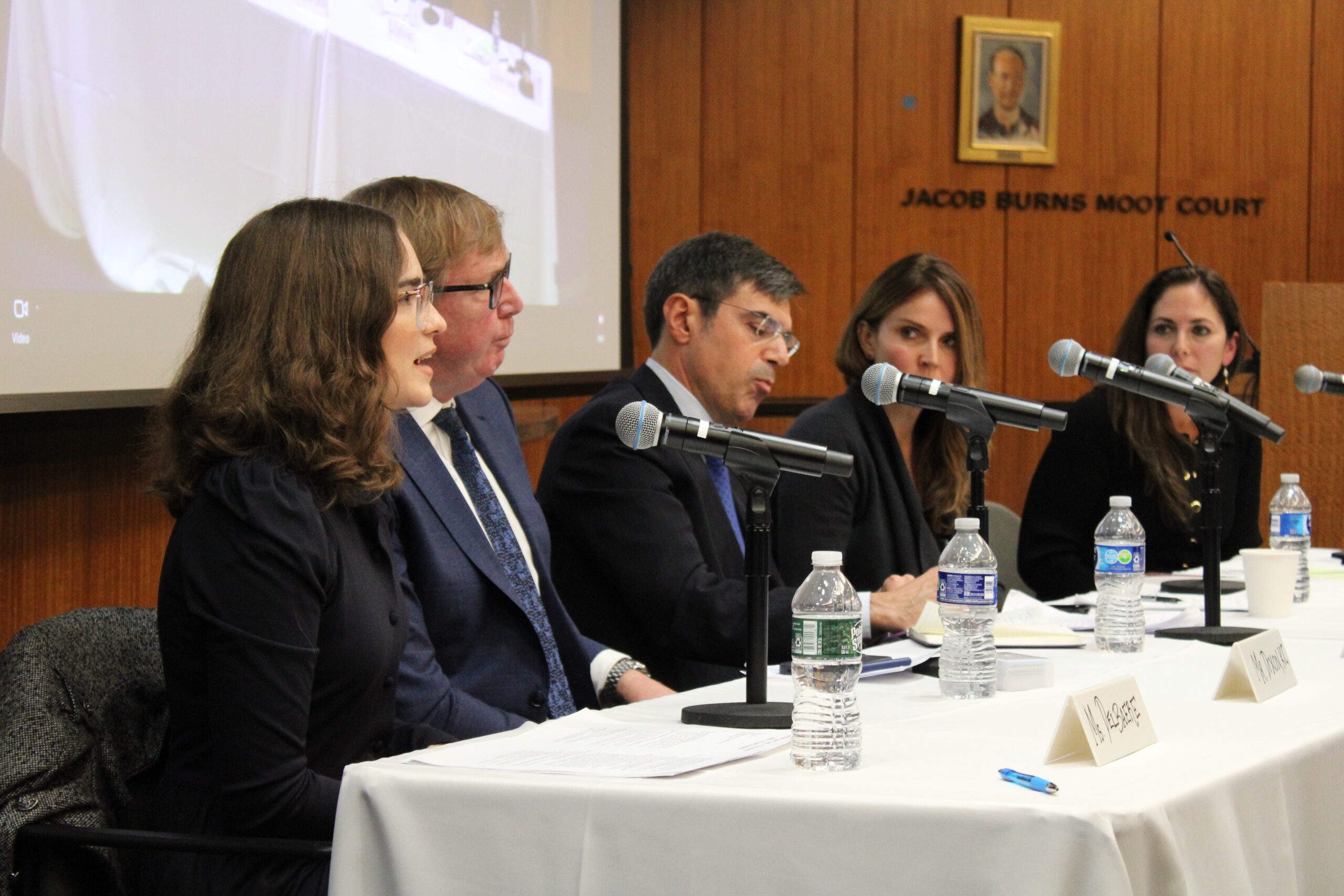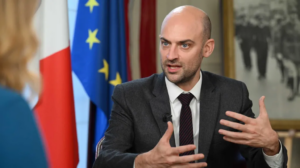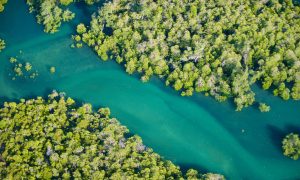David Donat Cattin, a member of our Advisory Council, has published an article titled “Violations of Human Rights and Available Remedies under International Law: The Case of the United Arab Emirates (UAE) and Mass Atrocities in Sudan.” The article also highlights key Action Points from a panel discussion held on November 15, 2024, at Cardozo Law School in New York.
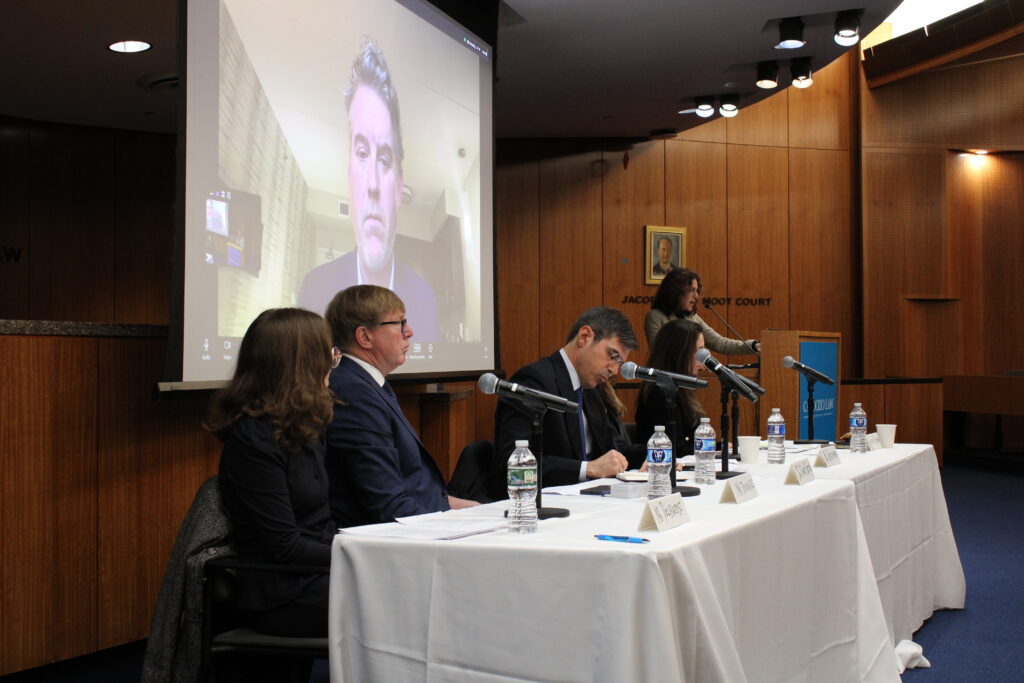
Panelists are, from left to right: Ruth Delbaere, Rodney Dixon, David Donat Cattin, Justyna Gudzowska, and Jocelyn Gergen Kestenbaum – Kyle Matthews on video
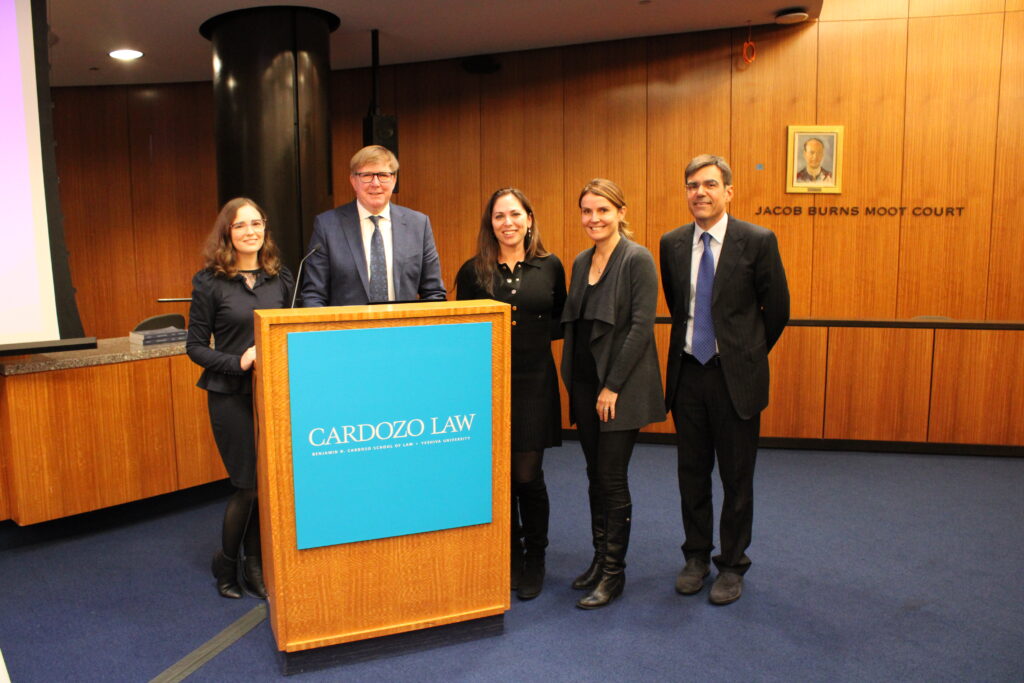
photo credits to Marina Coriale, Cardozo Law School.
Action Points from a Panel Discussion held on November 15, 2024, at Cardozo Law School in New York
Two academic think tanks – the Cardozo Law Institute in Holocaust and Human Rights Studies and the Montreal Institute for Global Security –, two students’ associations – Cardozo International Law Society and NYU’s Student Association for Global Affairs (SAGA) –, four Committees of the NYC Bar Association (NYCBA), and a large human rights NGO – Avaaz – united their forces on November 15, 2024, to alert the general public about the disruptive role played by an authoritarian regime of the Persian Gulf, the United Arab Emirates (UAE), vis-à-vis its citizens and against the civilian populations of Sudan, the most underrated humanitarian disaster caused by a civil war. These groups co-sponsored a vibrant Panel Discussion hosted by Cardozo Law School in New York that can be viewed here: https://www.youtube.com/watch?v=a-yxUFy-6bk .
The UN Special Rapporteur on the Situation of Human Rights Defenders, Prof. Mary Lawlor (Trinity College, Dublin, Ireland) outlined the shocking reality of politically motivated convictions against peaceful dissidents in the UAE, based on an extremely vague definition of terrorism that allows the imposition of life-imprisonment or the death penalty in the absence of any violent act of terrorism. On July 10, 2024, 43 human rights defenders were condemned to a jail term for the remainder of their lives in contravention of fundamental human rights.
UAE’s Human Rights Defender in Exile Dr. Ahmed Al-Nuaimi (brother of one of the 43 UAE convicted Human Rights Defenders) provided a forceful testimony on the widespread and systematic deprivations of fundamental freedoms that have been put in place by the dictatorial regime of the Emirates against him, members of his immediate family and other critical voices. The systematic persecution of pro-democracy activists under the pretense that peaceful dissidents are dangerous ‘terrorists’ should open the eyes of the International Community and the public at large: Dr. Al-Nuaimi called for action within the International Community and the global public opinion in support of the unconditional release of all political prisoners inside the UAE.
Sudanese Human Rights Activist Niemat Ahmadi (President of the Darfur Women Action Group) delivered a powerful account of the mass atrocities that are occurring, once again, in Sudan against the civilian populations after the resumption of the armed conflict on April 15, 2023, when the Rapid Support Forces (RSF, also known as “Janjaweed coalition”) launched a military campaign against the Sudanese Armed Forces (SAF). Ms. Ahmadi specifically underscored the situation in Darfur, where RSF militias are targeting Darfuri African groups with genocidal conduct aimed at destroying these non-Arab groups like they were doing 20 years ago, regarding which arrest warrants had been issued by the International Criminal Court (ICC). She made an urgent call for an international intervention by the African Union (AU) and the UN to protect the civilian populations of Sudan, deliver necessary humanitarian assistance, and put an end to the impunity for mass atrocity crimes.
NYU’s Center for Global Affairs Professor Dr. David Donat Cattin (Co-Chair of the Working Group on Justice at the ICMGLT)stated that, as UN sources have been reporting, more than 10 million persons were forced to leave their homes in Sudan and are internally displaced persons or refugees, hence making Sudan the largest humanitarian disaster in the world today. The prevailing situation in Sudan stems from the essential support that the RSF has been receiving from the UAE, as also revealed by the New York Times in a pivotal investigative story published on September 21 [www.nytimes.com/2024/09/21/world/africa/uae-sudan-civil-war.html?unlocked_article_code=1.MU4.jWbU.Ch6O6NGa7P3T&smid=url-share]. It is no surprise to observe that the UAE is also systematically violating the most fundamental human rights of its citizens domestically. Dr. Donat Cattin qualified both situations in Sudan and within the UAE as “internationally wrongful acts” regarding which all States are entitled to undertake proportionate countermeasures under International Law.
Georgetown and Yale Law Professor Justyna P. Gudzowska addressed the Panel on behalf of The Sentry, highlighting that it is important ‘to follow the money’ of those who commit mass-atrocities, and to work towards effective, targeted sanctions. In respect of Sudan, she highlighted ongoing foreign interferences by Egypt, Iran, and Russia in support of the SAF, as well as the UAE sponsorship of the RSF, which is smuggling gold and other natural resources of Sudan via Dubai. Prof. Gudzowska stressed that some commanders of the RSF are already under UN Security Council sanctions, and States must be much more effective in implementing them. States and other actors must shed light on the professional enablers of mass atrocity crimes and gross human rights abuses, and take consequential action.
Barrister Rodney Dixon, KC, who litigated many high-profile cases before international courts and tribunals, described the jurisdictional avenues available to legal practitioners in assisting clients, especially victims of gross human rights abuses. In particular, he focused on the exercise of universal jurisdiction within States and the jurisdiction of the ICC, which exists today in Sudan, as essential tools to affirm the principle of Individual Criminal Responsibility. He underscored the strategic use of targeted sanctions by States as a deterrent against individuals abusing their power. Ultimately, the interconnected situations relating to the UAE and Sudan are stressing the need to bring about criminal prosecutions of the “enablers” of mass atrocity crimes, as their role as co-perpetrators should be explicitly prioritized by Prosecutorial authorities due to the gravity and causation of mass victimization.
Avaaz Legal Campaign Director Ruth Delbaere illustrated the petitions and campaigns launched by Avaaz, signed by millions of individuals in all regions of the world, on the Sudan and other human rights emergencies. While recognizing that it may be more difficult to take action in respect of the UAE, as it did not ratify the most relevant treaties on civil and political rights and on international criminal justice, Ms. Delbaere illustrated several innovative strategies to augment the level of exposure and pressure on this type of actors, drawing from Avaaz’s experience in exposing Qatar’s human rights violations in connection with the last FIFA World Cup. The recent boycott of a concert in Dubai by a famous rapper had a large media impact, and other forms of civil society action can play a reputational role and induce compliance by State authorities and decision-makers who give weight to international standing and reputation.
Economist Dr. Marcos Buscaglia, who authored the book: “Beyond the ESG Portfolio. How Wall Street Can Help Democracies Survive”, submitted enlightening observations on the automatic allocations of financial resources into the UAE that should be revisited once it becomes clear to institutional investors that attacks on democracy and systematic human rights abuses will inevitably augment the risks associated with such investments, and make them less profitable in the long-run. The intervention of Dr. Buscaglia stressed the important role that corporations and institutional investment funds may have in orienting large amounts of financial resources in orienting the behavior of oppressive regimes that want their sovereign fund(s) and State-owned companies to profit from the global financial markets.
Masterfully moderated by Prof. Jocelyn Getgen Kestenbaum (Director of the Cardozo Law Institute in Holocaust and Human Rights and the Benjamin B. Ferencz Human Rights and Atrocity Prevention Clinic), the Panel was opened by Kyle Matthews (Executive Director of the Montreal Institute for Global Security), who called on the International Community and the global media to change the prevailing narratives on the UAE as a happy hub for tourism, investment, sports, and entertainment, as it is an autocratic regime in which no prominent citizen is allowed to disagree with the Government, and to raise the level of global attention on the war in Sudan and the responsibility to protect its civilian populations. In the other opening statement, Prof. Sophia Murashkovsky Romma, Esq. (Co-Chair of the NYC Bar Association UN Committee, also representing the African Affairs, Int’l Law & Int’l Human Rights Committees) stated that the NYCBA is committed to the imperative of “Peace through the Law”, hence to support the fight against impunity for international crimes and towards the application of the law of State Responsibility to serious violations of International Law.
Panelists engaged in addressing questions from a vibrant audience on the legal remedies that are available to States and other stakeholders when addressing gross human rights violations committed by a State against its population and, at the same time, the atrocity crimes perpetrated against the civilian populations of another State, especially when such crimes are committed by militias that are armed, equipped, and financed by that State.
These are their main takeaways and Action Points from their debate:
- Gross Human Rights Abuses in the UAE are unlawful State acts.
The UAE’s recent trial and convictions for terrorism offenses of human rights defenders and intellectuals who had been demanding democratic reforms to the Government and had already spent more than 10 years in detention for treason-related charges constitute an internationally wrongful act under customary International Law and is attributable to the responsibility of the UAE. As independently verified by UN mandate-holders and reported by Special Rapporteur for Human Rights Defenders Prof. Mary Lawlor, the UAE trials and convictions to life imprisonment against 43 individuals are in direct breach of fundamental human rights such as (a) the right to life, liberty and security of person; (b) the prohibition of torture or cruel, inhuman or degrading treatment or punishment; (c) the right to equality before the law and to non-discrimination in its application; and (d) the prohibition of arbitrary arrest or detention.
- UAE sponsorship of the RSF in Sudan amounts to unlawful State acts and its leaders may be prosecuted as co-perpetrators of RSF’s mass-atrocity crimes against civilians.
The UAE military and financial support to the RSF in Sudan has been an indispensable, strategic contribution to the eruption of the armed conflict on April 15, 2024, which brought about the largest humanitarian emergency in the world, according to UN sources in 2024. In light of the violations of the UN Security Council’s arms embargo on Sudan and considering the widespread and systematic crimes against humanity and war crimes committed by the RSF, whose leader is also under Security Council targeted sanctions, there is no doubt that the UAE sponsorship to the RSF is an internationally wrongful actunder the International Law of State Responsibility. Additionally, the direct contribution to the RSF mass-atrocity crimes gives rise to the application of the principle of Individual Criminal Responsibility to UAE military and political leaders.
- All States are entitled to impose proportionate Countermeasures against the UAE.
Given the erga omnes nature of the obligations to respect human rights and International Humanitarian Law, all States are entitled, on behalf of the International Community as a whole, to impose countermeasures against the UAE: Such countermeasures must be aimed at inducing the cessation of the international wrongful acts, and – therefore – must be proportionate, reversible and temporary while not violating any fundamental human rights or any peremptory norms of International Law (jus cogens). Hence, States should establish domestic policies and unilateral measures by way of countermeasures, such as the targeted freezing of the assets of leaders, and their business interests, implicated in internationally wrongful acts (until such acts are ceased), and – in parallel – enforce existing multilateral sanctions, such as the UN Security Council’s arms embargo on all belligerents in Sudan.
- UAE’s leaders can be prosecuted before the ICC, which has jurisdiction in Darfur, and before national Courts exercising universal jurisdiction over crimes in Sudan.
Regarding the principle of Individual Criminal Responsibility, which applies to all forms of co-perpetration, the main avenues for accountability are:
- The International Criminal Court (ICC), which has jurisdiction under UNSC Resolution 1593 (2005) on crimes committed in Darfur (Sudan), where the RSF is systematically executing inhumane acts against non-Arab populations, including murder and extermination of males within local communities, rape and other sexual and gender-based crimes against women and girls, torture of detainees, etc.
- the exercise of universal jurisdiction by national courts that have relevant legislation on war crimes and crimes against humanity, such as torture and slavery.
- States should call for the UAE to stop its unlawful acts in Sudan and within the UAE.
Regarding other restrictive measures (retorsions) or policy measures aimed at responding to the human rights emergency in the UAE and the humanitarian disaster in Sudan, States and other stakeholders have several tools at their disposals, including:
- Diplomatic engagement with the UAE to demand compliance with international legal obligations;
- Changing the perception of the UAE and its international standing in global affairs;
- “Naming and shaming” in relevant human rights and IHL fora, based on the reports of the Independent International Fact-Finding Mission on Sudan or the analysis conducted by UN Mandate Holders on the UAE’s situation.
- “Change the narrative” on the UAE, which must cease its role in gross human rights abuses to be a credible host for global business, tourism, and entertainment hubs.
Civil society campaigns concerning the systematic suppression of fundamental human rights inside the UAE and the extreme gravity of the humanitarian emergency in Sudan must raise awareness and understanding in the International Community and “change the narrative” on the UAE. To increase the costs associated with the repetition and continuation of its internationally wrongful acts – given the significance of the reputation for the Emirates, especially Dubai, as a global business and tourism hub –, emphasis should be put on the following targeted actions:
- Global NGOs like “Avaaz” could launch campaigns and petitions calling for an end to gross human rights abuses inside the UAE, as they have already been doing in respect of the atrocity crimes in Sudan;
- Financial investigations by specialized NGOs like “The Sentry” and by investigative journalists could clarify the role of the UAE in the exploitation of gold and other resources extracted from Sudan, and in the violation or circumvention of UN sanctions regimes and other restrictive measures;
- The UAE bonds, its sovereign fund (the Abu Dhabi Investment Authority), as well as its State-owned companies should be removed from automatic financial investment schemes, such as the “Passive Investment Alternatives” applied to emerging markets for private equities, in recognition of the risks for institutional investors in supporting a repressive regime that uses its wealth against an open society.
Agenda & Concept Note
Video recording of the Panel

